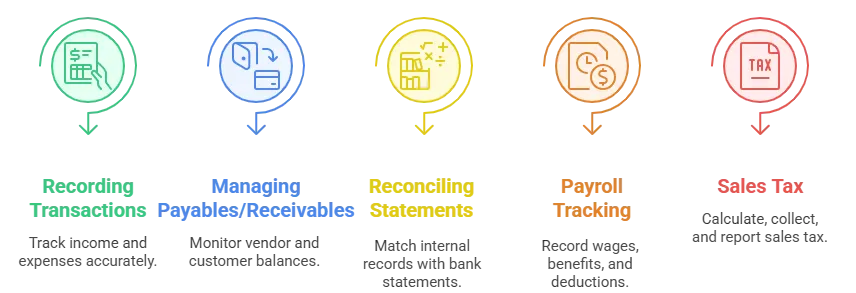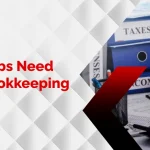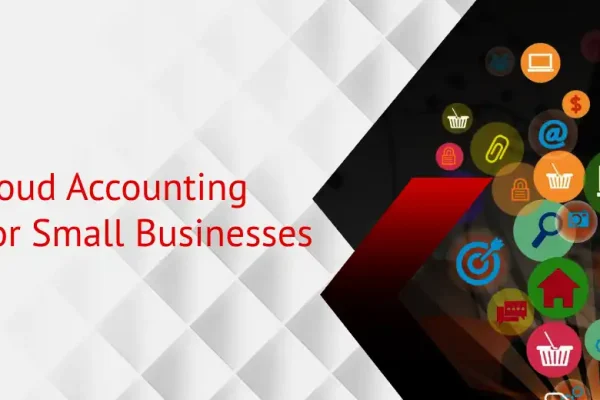The Complete Guide to Bookkeeping & Accounting for Small Businesses
Accurate bookkeeping and accounting are the foundation of a financially healthy business. They help you track income and expenses, manage cash flow, and make informed decisions. Without them, growth and compliance become difficult.
Bookkeeping focuses on the daily recording of financial transactions, while accounting involves interpreting, analyzing, and reporting those records. Both functions work together to give you a clear financial picture.
This guide will help you understand the essentials of small business bookkeeping and accounting. You’ll learn core principles, tools, and systems to stay organized, save time, and avoid costly mistakes.
What Is Bookkeeping?
Bookkeeping is the process of recording and organizing a business’s financial transactions daily. It ensures accurate financial records for tracking income, expenses, and overall financial health.
Manual vs. Cloud-Based Bookkeeping
- Pros and Cons: Manual bookkeeping is low-cost but prone to errors and time-consuming. Cloud-based bookkeeping is automated, accurate, and accessible, but may have subscription costs.
- Use Cases and Transitions: Manual suits very small or new businesses. As the business grows, transitioning to cloud-based tools improves efficiency and scalability.
What Is Accounting?
Accounting is the process of analyzing, summarizing, and reporting financial data. It helps businesses understand performance, ensure compliance, and make informed decisions.
Bookkeeping vs Accounting: A Simple Comparison
| Feature | Bookkeeping | Accounting |
| Primary Role | Recording daily financial transactions | Analyzing and interpreting financial data |
| Responsibilities | Data entry, invoicing, and bank reconciliation | Financial reporting, tax preparation, and budgeting |
| Tools Used | QuickBooks, Xero, Wave | Accounting software + spreadsheets, tax software |
| Reports Generated | Transaction logs, ledgers | Financial statements, tax returns, forecasts |
| Focus | Accuracy and completeness of records | Financial insights and compliance |
Core Bookkeeping Tasks for Small Business Owners
Every small business owner should be familiar with these essential bookkeeping duties to keep finances organized and compliant.

- Recording Transactions: Track all income and expenses to maintain accurate financial records and ensure nothing is missed.
- Managing Accounts Payable & Receivable: Monitor what you owe to vendors and what customers owe you to maintain healthy cash flow.
- Reconciling Bank Statements: Match your internal records with bank statements to identify errors or missing transactions.
- Payroll Tracking: Record employee wages, benefits, and deductions accurately for smooth payroll processing and compliance.
- Sales Tax Tracking and Reporting: Calculate, collect, and report sales tax correctly to avoid penalties and stay compliant with tax laws.
Key Accounting Principles Every Small Business Should Know
These core principles form the foundation of accurate and reliable financial management.
- Accrual vs. Cash Accounting: Accrual records transactions when they happen; cash records them when money moves.
- GAAP Principles in Simple Terms: GAAP ensures financial reports are consistent, transparent, and comparable.
- Double-Entry Accounting Explained: Each transaction affects two accounts, keeping your books balanced and error-free.
Hiring a Bookkeeper vs. DIY vs. Outsourcing
The right bookkeeping setup can save time, reduce errors, and support your business growth. Here’s how the options compare:
- DIY Bookkeeping
Pros: Low-cost and ideal for startups with limited transactions.
Cons: Time-intensive, higher risk of mistakes, not scalable as your business grows. - Hiring an In-House Bookkeeper
Pros: Offers dedicated support, better financial control, and immediate access to records. Partnering with firms like SuitsConsultants ensures you get qualified professionals without the stress of recruitment or training.
Cons: Higher cost due to salary and overhead, plus added HR responsibility. - Outsourcing Bookkeeping
Pros: Cost-effective and scalable, with access to experienced professionals.
Cons: Less direct control, and you need to vet providers carefully for data security and reliability.
Cost Overview
- DIY: $0–$30/month (basic software)
- In-House: $3,000–$5,000/month (including benefits and tools)
- Outsourced: $200–$800/month (depending on service scope)
Monthly, Quarterly & Annual Accounting Checklists
Consistent check-ins keep your finances healthy and ready for tax season.
- Monthly: Reconcile accounts, send invoices, pay bills, review income/expenses.
- Quarterly: File estimated taxes, analyze profits, adjust forecasts and spending.
- Annually: Prepare tax documents, close books, assess business performance.
Common Bookkeeping & Accounting Mistakes (And How to Avoid Them)
Avoiding these pitfalls saves you time, money, and compliance trouble.
- Mixing personal and business accounts – Creates confusion and tax issues.
- Skipping reconciliation – Can lead to missed fraud or accounting errors.
- Ignoring cash flow – May result in being unable to cover essential expenses.
- Not backing up data – Risk losing all records in case of system failure.
How Accurate Bookkeeping Helps You During Tax Season
Clean books make filing taxes smoother and help you claim what you deserve.
- Helps calculate deductions and credits correctly.
- Ensures you or your CPA file accurate returns without last-minute panic.
- Keeps your business audit-ready and free from tax penalties.
Legal & Compliance Considerations
Keeping records legally ensures smooth audits and protects your business.
- US: IRS recommends keeping records 3–7 years; UK/CA have similar guidelines.
- Keep invoices, receipts, payroll, and tax documents securely stored.
- For EU or global sales, ensure GDPR-compliant storage of financial data.
Integrating Accounting with Other Business Systems
Connecting systems reduces manual errors and boosts efficiency.
- Inventory: Auto-updates COGS and stock from each sale.
- CRM: Aligns customer billing and outstanding payments.
- Payroll: Syncs salary, tax, and compliance data.
- E-commerce: Auto-imports revenue and fees from Shopify, WooCommerce.
How to Read Your Financial Statements
Understanding reports helps you make better business decisions.
- Income Statement: Shows revenue, expenses, and net profit.
- Balance Sheet: Summarizes assets, liabilities, and equity.
- Cash Flow Statement: Tracks how money moves in and out.
- KPIs to Watch: Net Profit Margin (profitability), Current Ratio (liquidity).
FAQs on Small Business Accounting & Bookkeeping
Quick answers to the most common questions business owners ask.
- Do I need both a bookkeeper and accountant?
A bookkeeper handles daily entries; an accountant analyzes and files taxes.
Having both ensures clean records and smart decisions. - What are the best free tools?
Wave is great for invoicing and accounting; Zoho Books offers a free tier; Google Sheets works for basic tracking. - How much should I budget?
Expect ~$200–$400/month for professional bookkeeping; DIY costs time but saves money short-term.
Useful Resources and Tools
Use these trusted resources to improve your financial management.
- Government Guides: IRS, HMRC, CRA
- Templates: Free invoice, P&L, and bookkeeping templates from SuitsConsultants.
- Courses: Coursera (Accounting for Beginners), LinkedIn Learning (QuickBooks, Xero).
Conclusion: Build Financial Clarity and Control
Strong bookkeeping and accounting bring peace of mind, better decisions, and long-term growth.
Don’t guess your way through finances—let SuitsConsultants help you set up or manage your system for total clarity and compliance. Book a consultation today.






